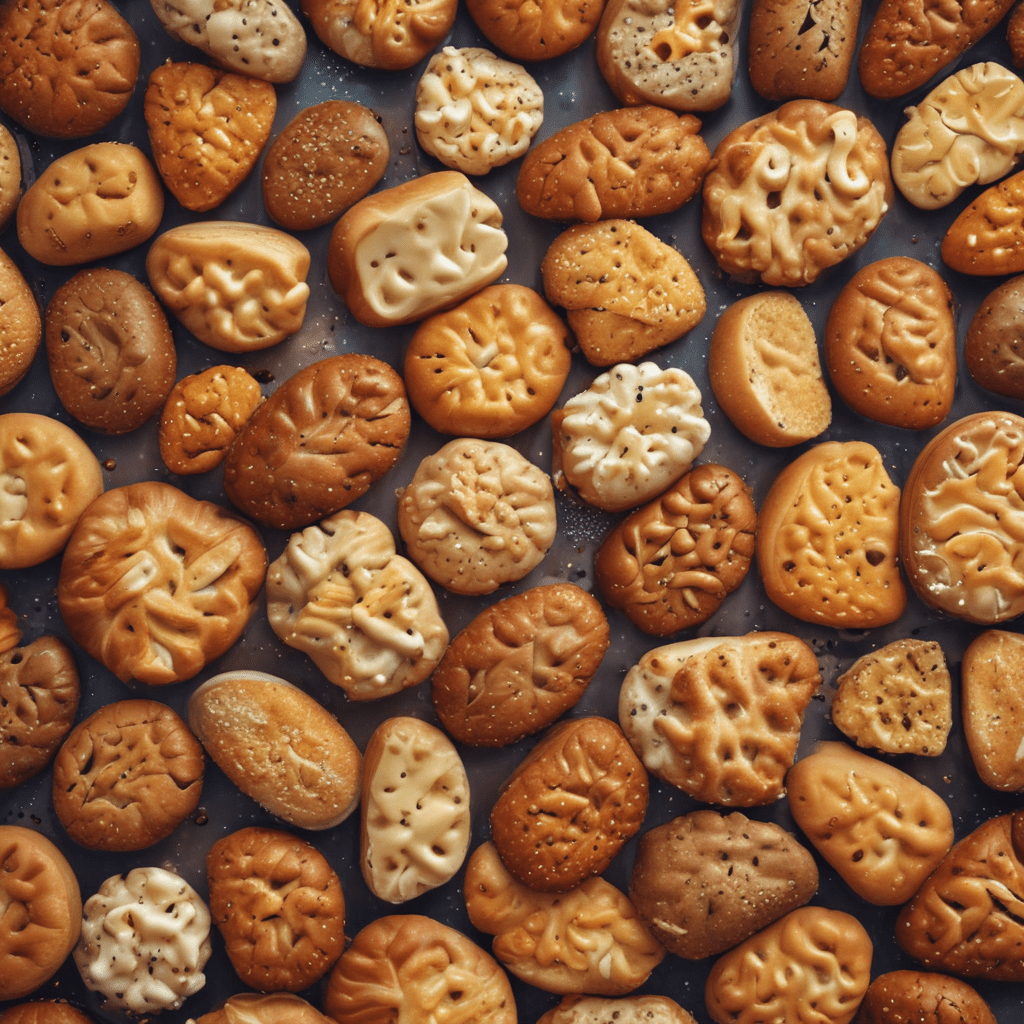
Snack Attack: Nourishing Options for Late-Night Cravings
1. Introduction: Understanding Late-Night Cravings
The rumbling in your stomach, the persistent thoughts of food, the irresistible urge to raid the pantry – late-night cravings are a common foe in the battle for a healthy lifestyle. But before you succumb to the siren call of sugary snacks or greasy treats, it's important to understand the science behind these desires.
These unwelcome urges often stem from a combination of biological and psychological factors. Hormonal fluctuations, particularly dips in serotonin and leptin, can trigger hunger pangs and cravings for high-carbohydrate or sugary foods. Additionally, stress, boredom, and sleep deprivation can fuel emotional eating, leading us to seek comfort in food even when our bodies don't truly need it.
Unfortunately, indulging in late-night cravings can have detrimental effects on our health. The sudden influx of calories can disrupt sleep patterns, leading to fatigue and impacting our ability to concentrate. Over time, frequent unhealthy snacking can contribute to weight gain and increase the risk of chronic diseases like diabetes and heart disease.
2. Strategies for Combating Cravings
Fortunately, there are numerous strategies we can employ to combat these unwelcome cravings and make healthier choices. The first step is to identify your triggers. Are you more likely to reach for snacks when stressed, tired, or bored? Once you understand the patterns, you can develop coping mechanisms to address these triggers.
Stress-management techniques like meditation, deep breathing, or yoga can help calm your mind and reduce cravings. If boredom is the culprit, find alternative activities to engage in, such as reading, listening to music, or spending time with loved ones.
Another effective technique is to delay your cravings. Often, the urge to snack will pass if you can distract yourself for even 10-15 minutes. During this time, try drinking a glass of water, as dehydration can sometimes be mistaken for hunger. Additionally, brushing your teeth can create a sense of closure and signal to your brain that it's time to wind down for the night.
3. Importance of Sleep Hygiene
Prioritizing quality sleep is paramount in managing late-night cravings. When we're well-rested, our hormones are better regulated, reducing the likelihood of those pesky hunger pangs. Aim for 7-8 hours of sleep each night and establish a consistent sleep schedule, going to bed and waking up around the same time each day.
Create a relaxing bedtime routine to wind down before sleep. This could include taking a warm bath, reading a book, or listening to calming music. By prioritizing sleep hygiene, you'll not only improve your overall health and well-being but also reduce the power of late-night cravings.
4. Choosing Nutritious Snacks
Now, let's talk about the good stuff – the nourishing snacks that can actually satisfy your late-night hunger without sabotaging your health goals. When choosing a snack, prioritize options that provide complex carbohydrates, protein, and healthy fats for sustained energy and satiety. These will keep you feeling fuller for longer, reducing the likelihood of reaching for another snack shortly after.
Some excellent choices include whole-grain toast with avocado and a sprinkle of sea salt, Greek yogurt with a handful of berries and a drizzle of honey, or a small bowl of oatmeal with nuts and seeds. These snacks are not only delicious but also provide essential nutrients your body needs to thrive.
5. Mindful Eating Practices
Mindful eating plays a crucial role in managing cravings. By consciously focusing on the experience of eating, you become more aware of your body's hunger and satiety cues. This helps you avoid mindless snacking while watching TV or scrolling through social media, which can lead to overeating.
When you do reach for a snack, take your time and savor each bite. Notice the texture, the flavors, and the aromas. This practice helps you appreciate your food more fully and prevents you from overindulging.
6. Managing Emotional Eating
Often, late-night cravings are triggered by emotions rather than physical hunger. When you're feeling stressed, anxious, or overwhelmed, you may turn to food for comfort. Understanding this connection is crucial for managing emotional eating.
The next time you reach for a snack, pause and ask yourself if you're truly hungry or if you're using food to numb an emotion. If it's the latter, try finding other ways to cope with your feelings, such as talking to a friend, journaling, or taking a walk.
7. Planning and Preparation
One of the best ways to avoid unhealthy late-night snacking is to be prepared. Keep a variety of healthy snacks on hand at home so you have something nutritious to reach for when those cravings hit. Additionally, consider preparing your snacks in advance so you don't have to resort to unhealthy options when you're tired and hungry.
Planning and preparation not only save you time and energy but also help you make healthier choices when you're short on time or willpower.
8. Portion Control and Moderation
While we've explored a variety of healthy snack options, it's important to remember that portion control is still essential. Even the healthiest foods can contribute to weight gain if consumed in excess. Pay attention to your portion sizes and avoid overeating, even with healthy snacks.
If you have a sweet tooth, indulge in a small treat occasionally, but do so mindfully and within moderation. Remember, it's all about balance and enjoying all foods in moderation.
9. Alternatives to Snacking
Sometimes, the best way to curb cravings is to distract yourself with another activity. Instead of reaching for a snack, try reading a book, listening to music, taking a warm bath, or spending time with loved ones. These activities can help take your mind off food and provide a sense of relaxation and contentment.
If you're feeling restless, consider getting some light exercise. A short walk or even a few stretches can help release endorphins and improve your mood, reducing the urge to snack.
… (To be continued)
10. Conclusion
By understanding the causes of late-night cravings, employing effective strategies for combating them, and making informed choices about the snacks you consume, you can take control of your eating habits and maintain a healthy lifestyle. Remember, it's all about making small, sustainable changes that work for you.
6. Managing Emotional Eating
Late-night cravings often become intertwined with our emotional well-being. When we experience stress, anxiety, or sadness, we may seek solace in the comfort of food. These feelings can trigger the release of stress hormones like cortisol, leading to increased cravings for sugary and high-fat foods.
It's crucial to recognize the link between emotions and eating habits. When you reach for a late-night snack, take a moment to pause and reflect on your emotional state. Are you feeling overwhelmed, lonely, or bored? Identifying the underlying emotions can help you address them in healthier ways, such as talking to a trusted friend, engaging in relaxation techniques, or pursuing a creative activity.
Instead of using food as an emotional crutch, explore alternative coping mechanisms that nourish your mind, body, and soul. Consider journaling to express your emotions, practicing mindfulness meditation to cultivate inner peace, or engaging in physical activities that release endorphins and improve mood. Remember, emotional eating is often a symptom of a deeper issue, and addressing the root cause is essential for long-term success.
7. Planning and Preparation
When it comes to conquering late-night cravings, preparation is your greatest ally. Having healthy snacks readily available at home can prevent you from reaching for less nutritious options when hunger strikes. Stock your pantry and refrigerator with a variety of wholesome choices like fresh fruits and vegetables, whole-grain crackers, nuts and seeds, or low-fat yogurt.
Planning your snacks in advance can further reduce the temptation to indulge in unhealthy choices. During your free time, prepare a few options to have on hand for those moments when cravings arise. This could involve slicing up some vegetables, portioning out nuts, or making a batch of overnight oats. By taking the time to prepare nutritious snacks beforehand, you'll be less likely to succumb to unhealthy cravings later on.
8. Portion Control and Moderation
Even with healthy snack options at your disposal, portion control remains crucial. It's easy to overeat, even when the food is nutritious. Pay attention to serving sizes and be mindful of how much you consume. A small handful of nuts, a few slices of apple with peanut butter, or a single serving of Greek yogurt can satisfy your hunger without overdoing it.
If you have a sweet tooth, indulging in a small treat occasionally can be part of a balanced diet. Choose a healthy dessert option like dark chocolate, a small piece of fruit, or a homemade smoothie. Enjoy these treats mindfully and within moderation, remembering that balance is key to sustainable healthy eating.
9. Alternatives to Snacking
Sometimes, the best way to counter cravings is by distracting yourself with other activities. When the urge to snack hits, consider engaging in alternative pursuits that bring enjoyment and relaxation. Read a captivating book, listen to soothing music, take a warm bath, or spend quality time connecting with loved ones. These activities can shift your focus away from food while providing a sense of fulfillment and contentment.
If you're feeling restless, engage in some gentle exercise. A short walk, a few yoga stretches, or a simple dance session can release endorphins, improve your mood, and reduce cravings. Remember, physical activity is not only beneficial for your physical health but can also play a significant role in managing emotional well-being and reducing stress-induced cravings.
10. Conclusion
Conquering late-night cravings requires a multi-pronged approach that addresses both the physical and emotional aspects of hunger. By understanding the causes of these cravings, employing effective strategies to manage them, and making informed choices about the snacks you consume, you can take control of your eating habits and maintain a healthy and fulfilling lifestyle.
Remember, small, sustainable changes can make a significant difference. By incorporating these tips into your daily routine, you can empower yourself to make healthier choices, nourish your body and mind, and achieve your wellness goals.
Frequently Asked Questions (FAQs)
Q: What are some of the best healthy snacks for late-night cravings?
A: Whole-grain toast with avocado, Greek yogurt with berries, a small bowl of oatmeal with nuts and seeds, carrot sticks with hummus, cucumber slices with cottage cheese, and air-popped popcorn are all excellent choices.
Q: How do I break the cycle of emotional eating?
A: Identifying your emotional triggers and developing healthier coping mechanisms is key. Consider journaling, practicing relaxation techniques, engaging in physical activities, and seeking support from a therapist or counselor if needed.
Q: Is it okay to have a cheat meal or treat occasionally?
A: Absolutely! Indulging in a favorite treat occasionally can be part of a balanced diet. However, focus on moderation, savor your treat mindfully, and return to your regular healthy eating patterns afterward.
Q: How can I improve my sleep hygiene for better overall health?
A: Establish a consistent sleep schedule, create a relaxing bedtime routine, optimize your bedroom environment for darkness and quiet, and limit screen time before bed.
Q: Is it normal to have occasional late-night cravings?
A: Yes, it's common to experience occasional cravings, especially during times of stress or hormonal fluctuations. However, if these cravings become frequent or disrupt your sleep and overall health, it's important to address them with the strategies mentioned in this article.


